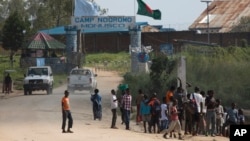The U.N. refugee agency reports thousands of people are fleeing from a fresh wave of intercommunal violence in the Democratic Republic of Congo’s Ituri region.
UNHCR reports more than 2,650 refugees, mostly women and children, have fled to Uganda in search of safety this week alone. It notes this is five times the usual number of arrivals.
The refugees tell aid workers renewed intercommunal violence at Djugu territory have sent them fleeing for their lives.
UNHCR spokeswoman Cecile Pouilly says the majority of refugees are crossing Lake Albert on rickety fishing vessels. She says many are bringing valuable belongings such as motorbikes and livestock.
“Since Monday, there were reports of houses being scorched in the areas and people attacked with machetes. More than 20 villages also are reported to have been abandoned due to fear of reprisals. Refugees report that many more people are waiting to cross despite the journey’s high cost,” Pouilly said.
Sporadic intercommunal violence between the Hema and Lendu ethnic groups in Ituri, sparked by land disputes, has been going on for decades. Pouilly says this latest exodus is putting even more strain upon Uganda, which already hosts some 1.4 million refugees, the largest number in Africa.
She says the UNHCR is stepping up its aid for the displaced. But this, she says, is becoming increasingly difficult to do since the agency has received only 39 percent of financing required for its operational needs.
Pouilly says more money is urgently needed to provide shelter and to assist people with special needs. These include unaccompanied children, survivors of sexual and gender-based violence, pregnant women and people with disabilities.




